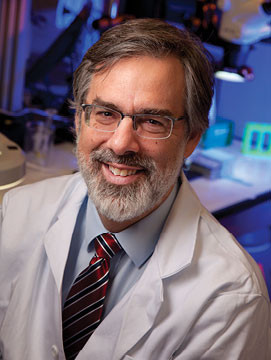C. Ross Ethier, Ph.D. (Emeritus)
Biomedical Engineering
Emory University
Recruited: 2012
Ross Ethier is a leading expert in biomechanics – the study of how living cells and tissues respond to mechanical stress – which gives him the upper hand in finding new treatments for glaucoma.
Glaucoma typically occurs when the pressure in the eye increases, damaging the optic nerve and potentially leading to blindness. The only known treatment for glaucoma is lowering the pressure in the hope of preventing neural damage.
Ethier seeks to prevent glaucoma from damaging cells inside the optic nerve, either by helping these cells better resist the effects of pressure in the eye or by lowering the pressure altogether. For example, using his knowledge of biofluid mechanics, he is attempting to create therapies that can regulate the drainage of fluid to maintain a healthy pressure level within the eye.
In addition to his intense study of glaucoma, Ethier investigates the role of biomechanics in osteoarthritis and arterial disease.
Research
Ethier’s glaucoma research is largely aimed at developing a new, mechanically-based strategy to protect fragile neural cells. In osteoarthritis, he is investigating how magneto-mechanical stimulation can give rise to differentiation and (appropriate) proliferation of mesenchymal stem cells. In atherosclerosis, Ethier is determining how fundamental homeostatic setpoints for mechanical stimulation are set by vascular endothelial cells.
In the lab, Ethier has developed tools to better understand how intraocular pressure is regulated in the eyes of mice. This opens up the possibility of using transgenic models to unravel the molecular mechanisms of pressure mechanotransduction and control in the human eye.
Choosing Georgia
Ethier was attracted to Georgia by the reputation of the Wallace H. Coulter Department of Biomedical Engineering at Georgia Tech and Emory, which is home to a critical mass of researchers with expertise in biomechanics, stem cell biology, microfabrication, biomaterials and other disciplines. Ethier liked the department’s collaborative atmosphere and its dedication to working on important problems in health and disease, and the strong support of infrastructure, students, staff and resources.
Intellectual Property
1

